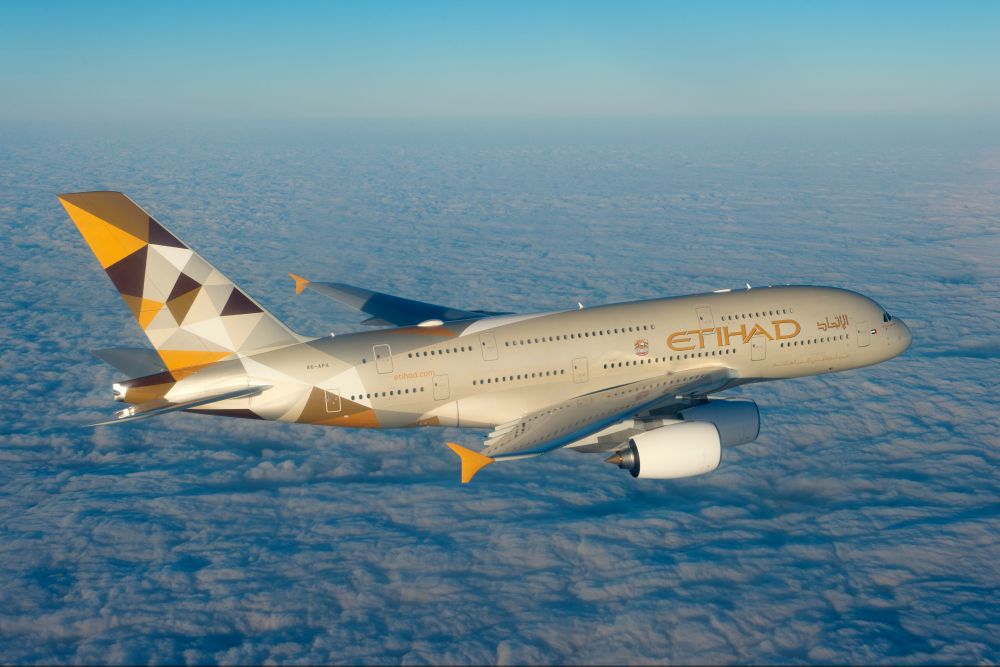
© P. Masclet
Etihad Airways, the national airline of the United Arab Emirates, is offering pilots seconded from partner airlines the opportunity to transfer to permanent contracts, flying the carrier’s most advanced Airbus and Boeing aircraft.
The pilot secondment programme, a part of Etihad Airways strategy for international expansion, began in April 2013 when the first batch of seven airberlin Boeing 737-rated First Officers arrived in Abu Dhabi to start type conversion training on the Boeing 777 at Etihad Airways’ Flight Training Centre.
To date, there are almost 200 partner airline pilots seconded to Etihad Airways. This includes 52 pilots from airberlin, 41 from Alitalia, 63 from Jet Airways, 25 from City Liner, four from Darwin Airline and six from NIKI. They have all been handpicked for their flying experience and skills.
Upon joining, seconded pilots undergo an extensive training programme that lasts from three to five months. They complete a two-week induction programme to get acquainted with Etihad Airways standard flight operating procedures. This is followed by a three-week theoretical ground school training to gain the technical skills required to proceed to a four-week practical flight simulator training, which covers normal and non-normal as well as emergency situations.
Trainees then have to pass a simulator test to obtain their licence from the UAE General Civil Aviation Authority. This qualification is a prerequisite to start line training, flying with certified instructors for a minimum total period of three weeks until declared competent to perform the duties of an Etihad Airways pilot.
James Hogan, Etihad Airways’ President and Chief Executive Officer, said, “Our pilot secondment programme is such an exciting and unique opportunity for pilots across our group of partner airlines, many of whom have a wealth of experience and are passionate about flying. We are able to put our pilots at the forefront of modern aviation and look forward to welcoming many more to join our family.”
To date, 21 former airberlin pilots have transferred to permanent roles with Etihad Airways, flying Boeing 787 Dreamliner and Airbus A380 aircraft.
Pilot’s view
First Officer Julian Kirrinnis was seconded to Etihad Airways from airberlin in September 2013. Having worked for 24 years with two major commercial airlines in Germany, he has more than 17,000 hours on the A310, A330-600 and A320 family in addition to the A330 on international route network. He has also worked as a simulator instructor on the Airbus fleet for many years. Julian transferred to Etihad Airways in November 2014 and worked on the airline’s A330 fleet performing both flying and line training duties. He moved to the Airbus A380 fleet recently. Julian said, “Etihad Airways offered me all the necessary training to join the A330 fleet and now the A380. I did not hesitate to join the airline on a permanent contract because of the future possibility to get an upgrade to Captain, the airline’s strong growing fleet, the flexibility to change the fleet I operate on, and of course I enjoy the cultural diversity and lifestyle in Abu Dhabi.”
First Officer Tim Oschmann was also seconded to Etihad Airways from airberlin in January 2014 and has recently transferred to Etihad Airways on a permanent basis. He previously worked for three European operators, and upon joining Etihad Airways, had a record of 6,000 hours on Turboprobs, jet aircraft and the Boeing 737-800 series aircraft. He completed the full Boeing 777 type rating training last year and is currently undertaking the Boeing 787 training.
Tim said, “It did not take me long to decide to join Etihad Airways. It is the fastest growing airline in the world, offering rapid career prospects that would take much longer to achieve in Europe. Working for Etihad Airways is a rewarding experience. You get to travel the world, the package offered is competitive and Abu Dhabi will pleasantly surprise you for what it has to offer.”
Also part of Etihad Airways pilot secondment programme, the airline sends its own pilots on placements with partner airlines to expose them to new experiences and broaden their career opportunities. Currently the airline has four of its pilots on secondment to Air Serbia, two to Air Seychelles, one to Jet Airways, one to Etihad Regional and one to Alitalia.
Richard Hill, Etihad Airways Chief Operations Officer, said, “Safety and quality are paramount to the continuing success of our Etihad Aviation Group and by integrating our processes and systems, and through initiatives such as pilot secondments, we are able to promote a just culture whilst enhancing safety standards through the safety management systems across our partners.”
